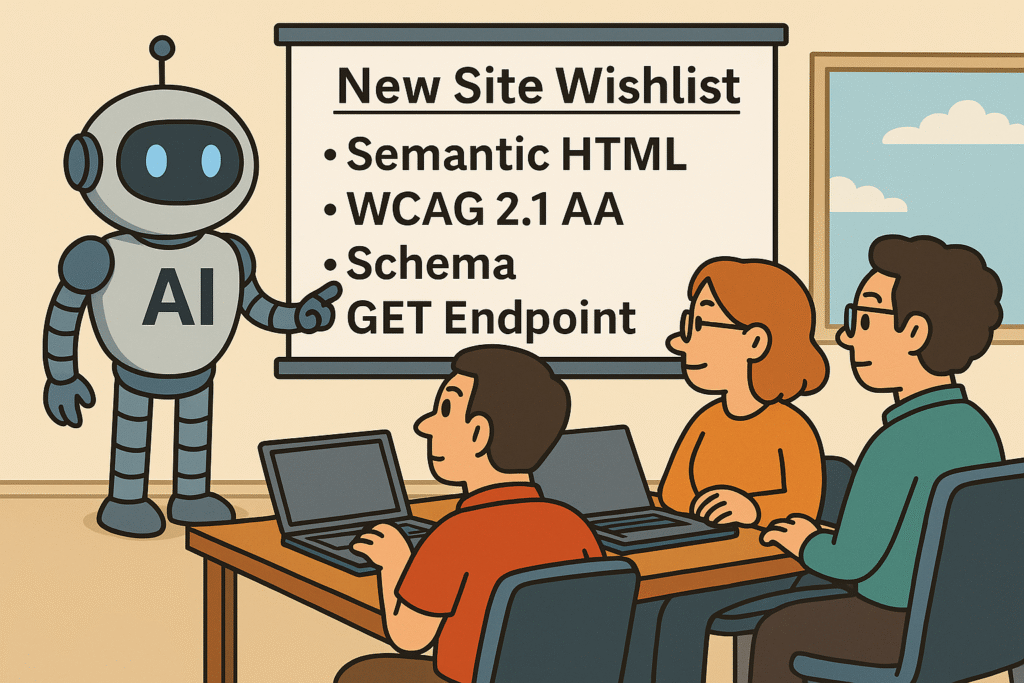
TL;DR – Agentic AI & Agentic Search In Summary
Agentic Search Optimisation prepares websites for AI agents that act on users’ behalf—researching, comparing, booking, and more. AS SEOs we are well placed to become Agentic AI optimisers and a big part of this is technical optimisation. We now need to think in terms of machine accessibility to content and interactions. This evolution of technical ‘search optimisation’ includes working now on semantic HTML, WCAG 2.1 accessibility standards, expanding schema, and machine-readable endpoints and API access to ensure content is actionable by AI. Futureproofing now is key as agentic systems rapidly reshape web interaction.
What is Agentic AI & Agentic Search?
Agentic AI to put it in the most simple way I can think of is using your AI tool as a personal assistant, (rather than simply as a research engine).
To put it another way Agentic AI refers to systems that don’t just answer questions but act on behalf of users—performing tasks like booking, buying, or compiling research. These systems are shifting how people interact with the web.
We knew that was the way these tools were going to go but this is the point where it is just becoming practical for more users to have access, without having to build tools and setup API access.
Agentic Search, more specifically, includes doing search for us and visiting the relevant pages for us, providing us with only the information that is relevant to our purpose, we can then make a decision and take an action or pass decision making and actions to the interactive AI Agent. We now need to think of website optimisation in terms of content accessibility and interaction accessibility therefore, a major shift and something some platforms are ill-prepared for.
How far is Agentic Search developed as of May 2025

Google I/O 2025 gave us a view of what Google’s Project Mariner, as part of Gemini (initially to be available in Gemini Ultra) is going to be able to do. The plan is for Mariner to complete complex web-based tasks completely autonomously. For now this doesn’t seem to include making purchases, but already includes comparing information across sites and comparing products and considering reviews, and even filling out some web forms including for appointment booking.
Open AI, Perplexity and Rewind are all developing similar features, Open AI may make announcements at their next Dev Day event. Expect this to move fast, with everyone wanting to get first mover advantage, but a major limitation will be how many sites the agents can interact with?
In the Google I/O 2025 Keynote demonstration (see below) of using Gemini’s Agent Mode to find suitable apartment listings all listings came from one site, Zillow, which presumably was adequately machine accessible and who have a long running association with Google.
Screengrab from Google I/O 2025 Keynote
An Example of using Agentic Search vs Traditional Search
So say our contract for a CRM tool is coming to an end and we want to check out the features on some other tools. Previously we might do a series of searches looking for the best rated CRMs, the latest, the best priced, the ones with the most features and even those with specific features we knew were important to us. This could take a full day and then having visited dozens of sites and made up a long list, maybe a spreadsheet to compile our research for key points, then we would create a shortlist and go through booking demo calls with each provider.
Now though we can just tell an AI agent what factors are important to us, maybe how much we want to spend, maybe what we like and dislike about our current software and it will do all the searching and reviewing for us, even perhaps checking reviews and judging if they are genuine. It can then fill out the demo request forms on each site: if they are compatible.
That’s a massive time saving, we now just need to turn up for the call and read the notes and questions that our AI agent has prepared for us, but we’ve not seen a SERPs (Search Engine Results Page) at any point. Some sort of search has been done, but even if we are using Google’s Gemini Agent mode for this, there’s been no search that matches what we traditionally think of as search.
Is Agentic Search Optimisation SEO?
Agentic Search is definitely still Organic or Earned, it could be described as Search Optimisation still but maybe not Search Engine Optimisation.
Is it a whole new industry though? No, it’s an evolution of the SEO industry into something fresh and we need to adapt but it still plays to our strengths and experience. It is SEOs who are best placed to benefit from this new opportunity.
All parts of what we do as SEOs are still happening here, they’ve just evolved, and fast. Building E-E-A-T signals are more important than ever, having the right information to match intent, intent of the agent or the agent matching the intent of its human master. Also we need to make sure we do our Technical SEO too, and Machine Accessibility is going to be an extension of Technical SEO and existing accessibility standards.
Technical Agentic Search Optimisation
A lot of this optimisation is not new and is what we have been doing already: either for SEO to ensure crawlers and renderers can see our content and get the context, or for accessibility e.g. meeting WCAG 2.1 AA standards.
Things like thinking about passage optimisation, ensuring content is visible in the Initial DOM, using Schema are all important to making your sites accessible to AI Agents, but now and going forward even more so.
Futureproofing your websites for Agentic Search

Agentic Search Optimisation with a fully compliant site is important to work on now for the future, Agentic Search is undoubtably the future but we will have to see how fast it evolves and becomes dominant, but now is the time to start preparing and especially if you are migrating your website any time soon.
You need to make sure that your website is futureproofed, especially for e-commerce and sites where there’s the chance for people to interact, book appointments etc. through the site. I’m going to do my best to tell you how to futureproof from a technical point of view right now at the dawn of agentic search therefore.
What are the main areas to check for Agentic AI & Agentic Search Optimisation
Semantic HTML –
Use meaningful tags to explain the elements on your pages, including in templates e.g. <article>, <nav>, or <header> allowing AI agents to understand the purpose and importance of content on different pages. Use H tags (H1, H2, H3 etc.) correctly for genuine headings, don’t use these and other tags simply for applying visual CSS styles that are applied to irrelevant parts of the page e.g. using a H2 in your global navigation for menu items.WCAG 2.1 AA not just for humans any more
– If you follow WCAG 2.1 AA your pages will be accessible to Screen Readers and other assistants for those with a variety of accessibility challenges. AI Agents will be able to access your content and understand the importance of elements in the same way as Screen Readers etc.Use a screen reader to see what an AI agent might see – If the screen reader is:- Focusing on elements of the page that don’t need reading or
- Reading content in the wrong order or
- Missing important content all together, or
- Not seeing images and Alt Text
- AI Agents may have the same issues.
Check reviews and ratings are fully visible and associated with products
– Some add-ons for reviews lazy load or only load when the page scrolls, the reviews as well as the ratings need to be in the initial DOM, and matching Schema that is in the Initial DOM too as a minimum, ideally both in the source HTML too.Don’t block checkout to bots
– Or booking forms, appointment booking, account pages or other ‘interaction’ pages. Agentic AI could mean AI accessing your site and buying, booking demos, viewings, appointments, flights, tickets, hotel rooms, checking previous orders, changing times and more, they need to access pages that were previously just for humans to do this.Don’t rely on SPAs, or too much JS, for checkouts and other actions
– Right now a lot of forms and other interactions are on pages that were aimed at humans only and so SPAs were fine, now these may be impossible or difficult for some AI Agents to access and work with.Use Schema types that could be relevant, even if not supported by Google Search
– There are over 800 Schema classes, in some cases with dozens of properties, but Google Search only officially supports around 30, such as Article, Product, Event.
AI Agents may start using and supporting more and more classes especially Action and subclasses such as BuyAction, ReserveAction etc. and EntryPoint to understand how to interact with a page. More specific content related classes could be supported as well but AI Agents coming across Schema they don’t support can still cross reference them on Schema.org to understand them.
So if there are more specific classes available that are relevant to content and interactions on your site future-proof by adding them (see our point on Migrations below).API access and data feeds
– Either as well as making the web pages fully accessible or as an alternative. Provide API access to endpoints or/and datafeeds with clean, machine accessible versions of content as well as products, possible interactions and other relevant entities.
Endpoints can include GET and POST endpoints as well as Querying and Refining Endpoints. GET endpoints could include for example a JSON-LD version of a webpage including all content and key images in a structured format.
These flat, lightweight ways to access the content or an interaction on a machine accessible URL are also a great way to cut down on resource requirements, token requirements and make accessing fresh data faster and less energy consuming, making the web greener.Futureproof when Migrating
– If you are migrating and want to futureproof your site you need to ensure that your site is fully accessible to machines for all content but also all interactions or you may need to migrate or make major updates to your site within as little as a year or less, things could well move that fast.
